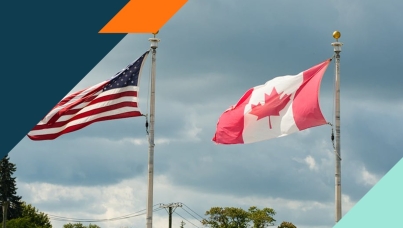Warning Labels On Bottles For The Risks Associated With Drinking Alcoholic Beverages
Respondents were then given a list of three approaches (a television/advertising campaign, an education program, and putting warning labels on bottles of alcoholic beverages) for each of these three risks and asked which would be the most useful in reducing the incidence. In each case a majority favours the education program, approximately a third the favours the television/advertising campaign, and one in ten to one in six think the warning labels on bottles would be the most useful. Full tabular results are outlined in the pages that follow.
Approximately half (53%) of Canadian women 18/19-45 years of age thinks "drinking alcoholic beverages should be allowed but should be regulated by government," four in ten (41%) think "drinking alcoholic beverages should be allowed without government involvement" and 4% think "drinking alcoholic beverages should be prohibited."
Seven in ten (71%) Canadian women 18/19-45 years of age say they drink alcoholic beverages and the same proportion (71%) say they serve alcoholic beverages to guests in their home.
These are the findings of an Ipsos-Reid/Brewers Association of Canada poll conducted from February 15th to February 17th, 2005. For the survey, a representative randomly selected sample of 1053 Canadian women of drinking age and childbearing age (18/19 years old-45 years old) was interviewed by telephone. With a sample of this size, the results are considered accurate to within 1773.0 percentage points, 19 times out of 20, of what they would have been had the entire Canadian population of women of drinking age and childbearing age been polled. The margin of error will be larger within regions and for other sub-groupings of the survey population. These data were weighted to ensure the sample's regional and age/sex composition reflects that of the actual Canadian population according to the 2001 Census data.
Three-quarters (75%) of women of drinking age and childbearing age believe that "most people who drink do so knowing what the risks are." One-quarter (24%) says "many people who drink are unaware of the risks associated with drinking."
- Women of drinking age and childbearing age who reside in Alberta (85%) are the most likely to think that "most people who drink do so knowing what the risks are," followed by those in Atlantic Canada (80%), Saskatchewan/Manitoba (78%), British Columbia (75%), and Ontario (75%). Of this population, Quebecers (69%) are the least likely to think so.
- Those women 18/19-45 years of age who drink alcoholic beverages are more likely than those who don't to think that "most people who drink do so knowing what the risks are" (78% vs. 70%).
- Those women 18/19-45 years of age who serve alcoholic beverages in their home are more likely than those who don't to think that "most people who drink do so knowing what the risks are" (79% vs. 66%).
- Those women 18/19-45 years of age with a minimum of a high school diploma are more likely than those without a high school diploma to know that women who drink alcoholic beverages during pregnancy risk birth defects (99% vs. 92%).
- There are no apparent grouping divisions with respect to this issue.
- There are no apparent grouping divisions with respect to this issue.
- Those women 18/19-45 years of age without a high school diploma are more likely than those with higher levels of education to think "putting warning labels on bottles of alcohol beverages" would be most useful (30% vs. 16%).
- Those women 18/19-45 years of age with a university degree are more likely than those with lower levels of education to think "having a campaign of television and other advertising" would be most useful (40% vs. 31%).
- Those women 18/19-45 years of age who serve alcoholic beverages in their home are more likely than those who do not to think "having a campaign of television and other advertising" would be most useful (36% vs. 29%).
- There are no apparent grouping divisions with respect to this issue.
- Canadian women of drinking and childbearing age residing in Ontario (58%) are the most likely to think that "drinking alcoholic beverages should be allowed but should be regulated by government," followed by those living in Quebec (54%), Saskatchewan/Manitoba (53%), Alberta (48%), and finally those residing in Atlantic Canada (45%) and British Columbia (45%).
- Atlantic Canadian women of drinking and childbearing age (54%) are the most likely to think that "drinking alcoholic beverages should be allowed without government involvement," followed by those living in British Columbia (47%), Saskatchewan/Manitoba (45%), Alberta (44%), Quebec (41%), and finally Ontario (36%).
- Those women 18/19-45 years of age without a high school diploma are more likely than those with higher levels of education to think "drinking alcoholic beverages should be prohibited" (14% vs. 3%).
- Those women 18/19-45 years of age who drink alcoholic beverages are more likely than those who don't to think that "drinking alcoholic beverages should be allowed without government involvement" (44% vs. 35%), while those who do not drink alcoholic beverages are more likely than those who do to think that "drinking alcoholic beverages should be prohibited" (12% vs. 1%).
- Those women 18/19-45 years of age who serve alcoholic beverages in their home are more likely than those who do not to think "drinking alcoholic beverages should be allowed without government involvement" (45% vs. 33%), while those who do not serve alcoholic beverages in their home are more likely than those who do to think that "drinking alcoholic beverages should be prohibited" (11% vs. 1%).
- Those women 18/19-45 years of age who think that "most people who drink do so knowing what the risks are" are more likely than those who think that "many people who drink are unaware of the risks associated with drinking" to think "drinking alcoholic beverages should be allowed without government involvement" (44% vs. 35%), while those who think most people are unaware of the risks are more likely than those who think people know the risks to say "drinking alcoholic beverages should be prohibited" (8% vs. 2%).
- Atlantic Canadian women of drinking and childbearing age (80%) are the most likely to say they drink alcoholic beverages followed by residents of Quebec (76%), British Columbia (74%), Saskatchewan/Manitoba (71%), Ontario (66%), and Alberta (64%).
- Those women 18/19-45 years of age with at least some postsecondary education are more likely than those with a high school diploma or less to say they drink alcoholic beverages (74% vs. 61%).
- The propensity to drink alcoholic beverages appears to increase with level of annual household income: 60% of those women 18/19-45 years of age with an annual household income of less than $30,000 say they drink alcoholic beverages vs. 70% of those with an annual household income of $30,000-$59,999 vs. 79% of those with an annual household income of $60,000 or more.
- Women of legal drinking age and childbearing age living in Quebec (80%) are the most likely to serve alcoholic beverages in their home followed by those living in Atlantic Canada (73%), Alberta (69%), Ontario (68%), Saskatchewan/Manitoba (64%), and British Columbia (63%).
- Those women 25-45 years of age are more likely than those 18/19-24 years of age to serve alcoholic beverages in their home (73% vs. 57%).
- Those women 18/19-45 years of age with at least some postsecondary education are more likely than those with a high school diploma or less to serve alcoholic beverages in their home (76% vs. 55%).
- The propensity to serve alcoholic beverages increases with level of annual household income: 48% of those women 18/19-45 years of age with an annual household income of less than $30,000 say they serve alcoholic beverages in their home vs. 71% of those with an annual household income of $30,000-$59,999 vs. 85% of those with an annual household income of $60,000 or more.
- Those women 18/19-45 years of age who say they drink alcoholic beverages are more likely than those who do not to serve alcoholic beverages in their home (85% vs. 36%).
-30-
For more information on this news release, please contact:
John Wright
Senior Vice-President
Ipsos-Reid Public Affairs
(416) 324-2900



